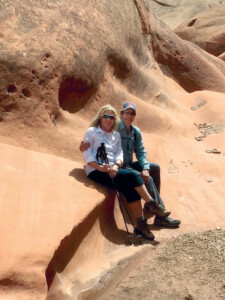For Jerry Belant, The World is A Research Lab
By Alison Fromme
Photographs courtesy of Camp Fire Program in Wildlife Conservation

Jesse and Betsy Mitchell-Fink. Photo taken last year in Escalante National Monument, Utah
ESF’s career development program, which has supported nearly 100 students over the last seven years, has been buoyed by a $250,000 gift from alumni Jesse Fink and Betsy Mitchell-Fink — the second such gift from the Finks since the program’s inception.
The Finks’ recent gift brings the total of their support for the program to a half-million dollars, and the program has been renamed the Betsy and Jesse Fink Career Development Program in their honor. The couple, who are members of the ESF Class of ’79, are commemorating the 40th anniversary of their graduation with new support for the College.
“We were on campus for a visit last September and we had a chance to meet some of the students who had been through the program,” Jesse Fink said in a telephone interview. “It’s one thing to read their reports about what they’ve done. It’s another to hear, in their own words, the passion they have for what they’re doing. We saw their enthusiasm and how the experience really changed their lives. It’s helping them form some clarity in their professional development and making them more marketable professionally.”
In addition to the gift to the career development program, Betsy Fink made a $25,000 gift to support the work of the ESF Center for Native Peoples and the Environment. The center, led by Distinguished Teaching Professor Robin Kimmerer ’75, creates programs that draw on the wisdom of both Indigenous and scientific knowledge to support environmental sustainability.
Betsy Fink said she was inspired by reading “Braiding Sweetgrass,” Kimmerer’s award-winning book that is subtitled “Indigenous Wisdom, Scientific Knowledge, and the Teachings of Plants.”
“I’ve always believed we have the knowledge we need to take care of the Earth,” Betsy Fink said. “I know the work of the center will help restore the Earth through sustainable environmental and cultural systems, and will foster the next generation of environmental leaders.
” Kimmerer said the gift will allow ESF to support the dreams of Indigenous students who choose to pursue graduate study at ESF.
“The result will be an increase in the number of Native American environmental scientists, who will infuse sustainability sciences with their unique cultural knowledge. Their success has profound ripple effects into their home communities, where our research focus on biocultural restoration contributes to revitalization of land and culture,” Kimmerer said. “Their ideas are already shaping the science of restoration, with an expanded vision. Leadership of Indigenous students on campus also enriches the learning environment for all ESF students.”
The Finks’ career development gift came from their Fink Family Foundation. The foundation provides guidance, investment and strategic advice to social entrepreneurs. Jesse Fink is a co-founder and non-executive chairman of Mission Point Partners, an impact investment manager and adviser focused on solving large-scale environmental problems through the deployment of high-impact capital. He is also co-founder and chairman of the board of ReFED, a multi-stakeholder platform that created a road map for food waste reduction in the United States, and he was co-founder and chief operating officer at Priceline.com.
Betsy Fink established Millstone Farm in Wilton, Connecticut, with a vision of healthful communities united through wholesome and culturally significant foods. She worked with local restaurants and markets to rebuild a regional food system and created a framework to explore the link between biodiversity and sustainable food systems. She is involved with biodiversity projects involving invertebrates and birds, and previously held positions at Prodigy Services and Priceline.com.
The recent gift builds on a $300,000 endowment built for the program by the ESF College Foundation, Inc. “What makes this program unique is that it’s donor-funded and student-driven,” said Dana Piwinski ’80, an ESF development officer. “We have never had a program like this, which allows students to take the initiative to come up with an idea and get support from a faculty member, then go spend the summer addressing some of the most important environmental challenges of our day.”
The fact that the students design their own projects is something the Finks want to support. “We’ve been very impressed with the program’s success, how it has been administered and the diversity of the projects,” Betsy Fink said.
“We wanted it to be student-driven; we didn’t want to narrow it down.”
Since 2013, 96 ESF students have received grants that enable them to pursue a professional experience.
“The career development program has provided students from every major at the College with opportunities for a one-of-a-kind experience,” said Dr. John Turbeville, assistant dean for student affairs and director of ESF Career Services. “In no small way, these opportunities have transformed individual students’ passions into a purpose. It is this resulting purpose which has had the most long-lasting impact on these students, both personally and professionally.”


